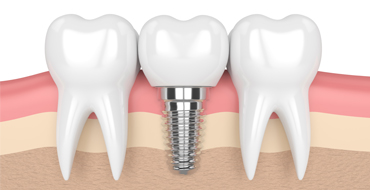Endodontic Procedures We Offer
Root Canal Therapy
Root canal therapy is a common procedure to treat infections or damage to the tooth pulp. The pulp is the soft tissue inside the tooth, and if it becomes infected or damaged due to decay or trauma, it can cause severe pain and swelling. During the procedure, the infected or damaged pulp is carefully removed, the canals inside the tooth are cleaned and disinfected, and then sealed to prevent future infection. This procedure is essential for saving the natural tooth and avoiding the need for extraction.
Dental Implants
Dental implants are a permanent and effective solution for replacing missing teeth. The process involves surgically placing a titanium post into the jawbone, which acts as a replacement root for the lost tooth. Once the post has integrated with the bone, a custom-made crown is placed on top to restore the tooth’s function and appearance. Dental implants are durable, functional, and feel like natural teeth, making them an excellent choice for those looking to replace missing teeth.
The Endodontic Process: What to Expect
Initial Consultation and Diagnosis
The first step is a consultation with the endodontist, where they will review your medical history and perform a thorough examination. Digital imaging or X-rays are typically used to assess the extent of the damage or infection, helping the endodontist develop a personalized treatment plan.
Step-by-Step of a Procedure
Once the treatment plan is established, the procedure begins. The area is numbed with a local anesthetic to ensure comfort throughout the process. The endodontist then removes the infected or damaged pulp, thoroughly cleans the root canals, and seals them to prevent future infections. This ensures that the tooth remains intact and functional.
Aftercare and Recovery
After the procedure, the endodontist will provide specific instructions for post-operative care to promote healing and reduce the risk of complications. Most patients experience only mild discomfort following the procedure, and recovery typically takes a few days. However, healing time may vary depending on the complexity of the treatment and individual factors.
When Should You Call an Endodontist?
It’s important to consult an endodontist if you experience persistent tooth pain, swelling, or sensitivity to temperature, especially if these symptoms do not subside with time. Additionally, a pimple-like bump on the gums near a tooth could indicate an abscess or infection that requires immediate treatment to prevent further complications.
Distinguishing Between Endodontists and General Dentists
Endodontists are specialists who have completed additional years of education beyond dental school, focusing on the diagnosis and treatment of complex dental issues involving the pulp and roots of the teeth. They are highly trained in performing intricate procedures such as root canals, and they use specialized tools to ensure that the procedure is done with precision and care.
Why Choose an Endodontist for Root Canals?
While general dentists can perform some types of dental procedures, endodontists are specifically trained to handle delicate and intricate procedures like root canals. Their specialized training allows them to provide more precise care, which can lead to better long-term outcomes and a higher rate of tooth preservation. Choosing an endodontist for procedures like root canals ensures that you are getting the best possible care for your tooth’s health.




